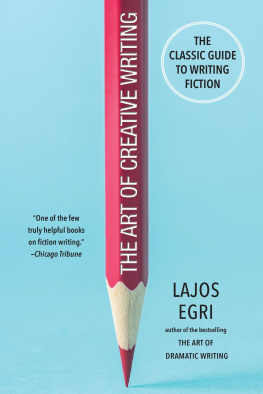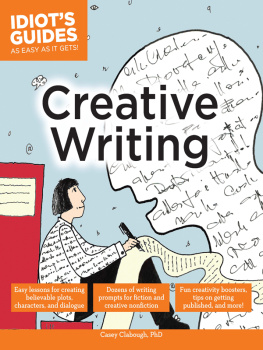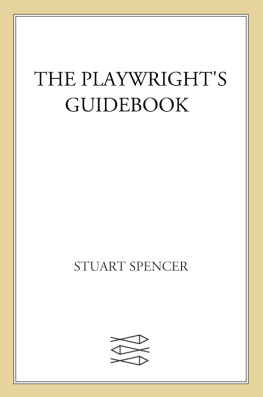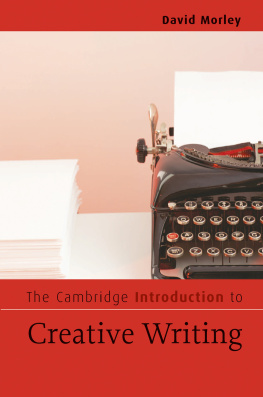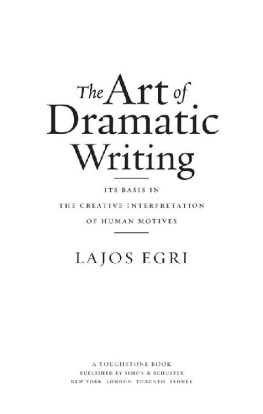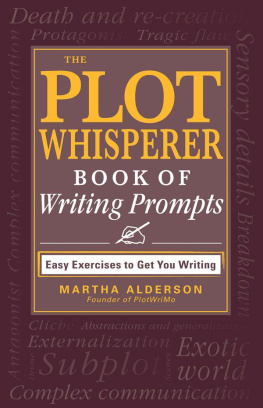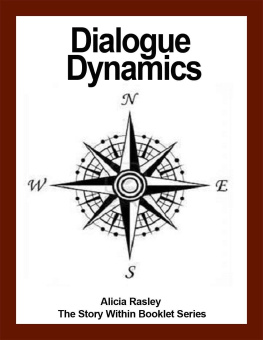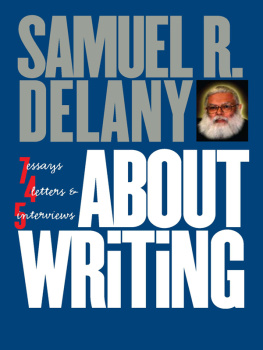Lajos Egri - The Art of Dramatic Writing
Here you can read online Lajos Egri - The Art of Dramatic Writing full text of the book (entire story) in english for free. Download pdf and epub, get meaning, cover and reviews about this ebook. year: 2007, publisher: Wildside Press, genre: Art. Description of the work, (preface) as well as reviews are available. Best literature library LitArk.com created for fans of good reading and offers a wide selection of genres:
Romance novel
Science fiction
Adventure
Detective
Science
History
Home and family
Prose
Art
Politics
Computer
Non-fiction
Religion
Business
Children
Humor
Choose a favorite category and find really read worthwhile books. Enjoy immersion in the world of imagination, feel the emotions of the characters or learn something new for yourself, make an fascinating discovery.

- Book:The Art of Dramatic Writing
- Author:
- Publisher:Wildside Press
- Genre:
- Year:2007
- Rating:3 / 5
- Favourites:Add to favourites
- Your mark:
- 60
- 1
- 2
- 3
- 4
- 5
The Art of Dramatic Writing: summary, description and annotation
We offer to read an annotation, description, summary or preface (depends on what the author of the book "The Art of Dramatic Writing" wrote himself). If you haven't found the necessary information about the book — write in the comments, we will try to find it.
The Art of Dramatic Writing — read online for free the complete book (whole text) full work
Below is the text of the book, divided by pages. System saving the place of the last page read, allows you to conveniently read the book "The Art of Dramatic Writing" online for free, without having to search again every time where you left off. Put a bookmark, and you can go to the page where you finished reading at any time.
Font size:
Interval:
Bookmark:
III
CONFLICT
1. Origin of Action
T H E blowing of the wind is action, even if it is only a breeze.
And rain is action, even to its name. The verb and the noun are one.
Our ancestor, the cave man, killed that he might eat
that was certainly action.
The walking of a man is action, the flight of a bird, the burning of a house, the reading of a book. Every manifestation of life is "action."
Can we, then, treat action as an independent phenomenon?
Let's look at wind. What we call wind is the mass contrac-tion and expansion of the invisible ocean of air which surrounds us. Cold and heat create this movement called "wind."
It is the result of varied contributing factors which make action possible. Wind, inactive, alone, is impossible.
Rain is the product of the sun and other factors. Without them there would be no rain.
The cave man killed. Killing is an action, but behind it there is a man who lives under conditions which force him to kill: for food, self-defense, or glory. Killing, although an
"action," is only the result of important factors.
There is no action under the sun which is the origin and the result in one. Everything results from something else; action cannot come of itself.
Let us look further for the origin of action.
Motion, we know, is equivalent to action. Where does motion come from? We are told that motion is matter, and matter energy, but since energy is generally recognized as motion, we're back where we started.
Let us take a concrete example: the protozoon. This one-celled creature is active. It eats and digests by absorption; it moves. It performs the necessary life activities, and they are, obviously, the outgrowth of something specific: the protozoon.
Is the action of the protozoon inherent or acquired? We find that the chemical composition of the animal includes oxygen, hydrogen, phosphorus, iron, calcium. These are all complex elements each highly active in its composition. It seems, then, that the protozoon inherited "action," with its other characteristics, from its multiple parents.
We had best halt our search right here, before it entangles us in the solar system. We cannot find action in a pure, isolated form, although it is always present as the result of other conditions. It is safe to say, we conclude, that action is not more important than the contributing factors which give rise to it.
2. Cause and Effect
In this chapter we shall divide conflict into four major divisions: the first will be "static," the second "jumping," the third "slowly rising," and the fourth "foreshadowing." We shall examine these different conflicts to see why one is static, and remains static regardless of what you do, why the second jumps, defying reality and common sense, why the third, the slowly rising, grows naturally without obvious effort from the playwright, and why without foreshadowing conflict no play can exist.
But first let us trace a conflict and see how it comes into being.
Assume that you are a gentle, inoffensive young man. You have never hurt anyone, nor have you any intention of breaking laws in the future. You are single, and you meet a girl who pleases you at a party to which you had not meant to go. You like her smile, the tone of her voice, her dress. Her tastes and yours coincide. In short, this seems to be the beginning of a deep-rooted love.
With great trepidation you invite her to see a show with you. She accepts. There is nothing wrong in this, nothing unusual, and yet it may be a turning point in your life.
At home you look over your wardrobe, which consists of the single suit you wear on all gala occasions. Under your critical eyes it sheds all the requirements you think necessary for such a suit. For one thing, you decide it is out of style; for another, it looks cheap and shabby. She is not blind; she is sure to notice.
You decide that you must have a new suit. But how? There is no money. What you earn you hand over to your mother, who keeps house for you and your two small sisters. Your father is dead, and your salary must take care of all the family expenses, the shoes for the children, the doctor bills for your mother. The rent is due.... No, you cannot buy a suit.
For the first time, you feel old. You remember that you are over twenty-five, that it will be years before either of your sisters is old enough to work. What's the use of planningof livingof taking your girl to the theater. Nothing can come of it, anyway. So, you drop her.
This step makes you cross at home, listless at business. You may brood over your condition; you will be despondent. You cannot stop thinking of the girl, of what she must think of you, of whether you dare call her up, of the impossibility of your ever seeing her again. You are negligent at the office, and before you realize it, you are out of a job. This does not improve your temper. You go on a frantic job hunt and find nothing.
You apply for reliefand get it, after a harrowing, long
drawn-out, shameful experience. You feel as useless as a squeezed lemon. After you get on relief you discover that you receive too little to sustain life well, but just enough to keep you from dying of hunger.
As you see, this conflict, and almost all conflict, can be traced to the environment, the social conditions of the individual.
Now the question is of what material you are made. How determined are you? How much stamina have you? What amount of suffering can you endure? What was your hope for the future? How farseeing are you? Have you imagination? Have you the ability to plan a long-range program for yourself? Are you physically able to carry out any program you may plan?
If you are sufficiently aroused, you will make a decision.
And this decision will set in motion forces to thwart itself, foreshadowing a counteraction which will oppose you. You may never be aware of the process, but the playwright must be. You never knew, when you invited this girl to the theater, that you had started a long chain of events which would culminate in your desperate decision to take action now. If you are strong enough, conflict is born, the result of a long, evo-lutionary process which might have begun with an everyday occurrencean invitation, perhaps.
If the young man makes a decision, but lacks the strength to carry it through, or if he is a coward, the play will be static, moving very slowly, and then on an even plane. The author would do best to leave such a character alone. He is not yet ripe enough to carry on a protracted conflict. If the dramatist has vision, he may be able to visualize this character at the psychological momentthe point of attackwhen the weakling or coward is not only able to face a battle, but can meet his adversary more than halfway. This will be discussed further under "Point of Attack."
J
CAUSE AND EFFECT 1
A jumping conflict would occur if the young man decided, upon seeing the shabbiness of his suit, to rob a bank, or hold up a passer-by. It is illogical that an inoffensive boy would arrive at such a conclusion so rapidly. There would have to be more crushing events, each more urgent and painful than the one before, to force him to take this fatal step.
It is possible that at a moment of frustration and despair a man will do the unexpected in real lifebut never in the theater. There we wish to see the natural sequence, the step-by-step development of a character. We want to see how the cloak of decency, high moral standards, is torn away from a character shred by shred by the forces emanating from him and from his surroundings.
Every rising conflict should be foreshadowed first by the determined forces lined up against each other. We shall make this clearer as we go along, but there is one thing we wish to emphasize here: all the conflicts within the big, major conflict will be crystallized in the premise of the play. The small conflicts, which we call "transition," lead the character from one state of mind to another, until he is compelled to make a decision.
Next pageFont size:
Interval:
Bookmark:
Similar books «The Art of Dramatic Writing»
Look at similar books to The Art of Dramatic Writing. We have selected literature similar in name and meaning in the hope of providing readers with more options to find new, interesting, not yet read works.
Discussion, reviews of the book The Art of Dramatic Writing and just readers' own opinions. Leave your comments, write what you think about the work, its meaning or the main characters. Specify what exactly you liked and what you didn't like, and why you think so.

